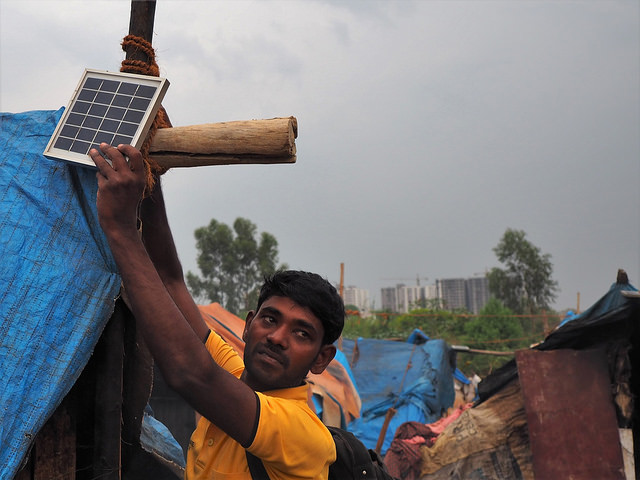Pollinate Energy: Electricity Access for the Urban Poor of India
 India is a nation of major economic growth and a huge population. The biggest cities of India like Mumbai, Hyderabad, Bangalore and Kolkata provide many opportunities, including to immigrants from rural areas who come in search of a better life. These immigrants mostly find their place in the slum areas of big cities.
India is a nation of major economic growth and a huge population. The biggest cities of India like Mumbai, Hyderabad, Bangalore and Kolkata provide many opportunities, including to immigrants from rural areas who come in search of a better life. These immigrants mostly find their place in the slum areas of big cities.
In India, there are almost 64 million slum dwellers who suffer from lack of basic necessities like clean water, sanitation and electricity. To compensate for the deficiency of electricity, they light kerosene oil lamps, which is dangerous, costly and damaging to the environment.
Indo-Australian nonprofit Pollinate Energy came up with an innovative solution of providing electricity access for the urban poor of India. Pollinate Energy is a social business, a model of self-sustainable business that aims to address social problems.
Solution for Electricity Access for the Urban Poor
The organization provides its solution through small, efficient solar panels with the ability to light LED lamps and also charging mobile phones. The system comes as a toolkit consisting of an easy-to-install solar panel, LED lamps and a rechargeable battery
The product is available in various types as torch, desk lamp, hanging light and even fixed light for separate rooms.
Method of Operation
The organization employs local men and women as salespeople, also known as pollinators, who help to sell the product in slum communities. These pollinators work on a commission basis and receive training, transport allowance and a smartphone to conduct their business. Along with selling the product, installing, servicing and collection of payment are part of their duties.
Customers are mainly families from slum communities who earn less than $2 per day, so they are able to pay in weekly installments over five to eight weeks. The customers are also given a trial period of one week to see whether the product fits their requirements.
The impact of the solution
To date, Pollinate Energy has serviced almost 953 communities, most of which were in slums. Pollinate Energy helped to save an average of $1.52 per week for each family by reducing kerosene use by 90 percent. It also prevented 2.97 million kilograms of carbon dioxide emissions. In the whole process, it is also empowering the youth by training them in local entrepreneurship. This is a huge positive impact on the community as well as the environment.
Future Prospect
Pollinate Energy started in Bangalore, expanded to Hyderabad and Kolkata and will eventually target the other cities of India. Apart from providing electricity access for the urban poor, it sells other sustainable and innovative products like water filters, wind fans and cookstoves.
Pollinate Energy is taking revolutionary steps in bringing social business as part of regular life and fulfilling a number of key aspects of the United Nations Sustainable Development Goals.
– Mahua Mitra
Photo: Flickr
